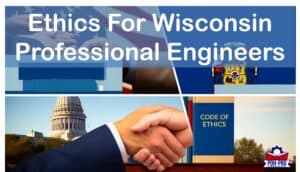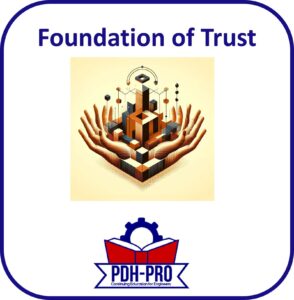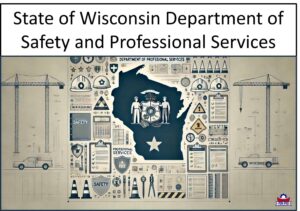Ethics and Professional Conduct – Wisconsin Requirements
Table of Contents
The Wisconsin Department of Safety and Professional Services requires every professional engineer to earn a minimum of 2 hours of continuing education courses in the topic of ethics and professional conduct every biennial renewal period . They allow credit for courses that address ethical conduct, Wisconsin engineering laws and rules, disciplinary hearings, as well as accidents that are cause by negligence and errors.
Wisconsin Administrative Code Chapter A-E 13.03 is the specific section of code that describes the ethics training requirement. It requires all professional engineers working in the state to complete 2 Professional Development Hours (PDHs) in ethics biennially (i.e. 2 year renewal period). The Board puts the responsibility of evaluating continuing education courses on the professional engineer.
To maintain their license, engineers need at least two hours of professional development in ethics biannually.
Ethics Courses Accepted by the Wisconsin Board
To help PEs in Wisconsin comply with these requirements, we at PDH-Pro reviewed the Wisconsin regulations and consulted with the Board to develop a series of courses that meet all of the requirements. The following section presents a review of these courses.
We developed the following courses specifically to meet the Wisconsin Examining Board of Architects, Landscape Architects, Professional Engineers, Designers and Land Surveyors requirements. All of the following ethics courses meet the two hour Wisconsin ethics CEU requirement and are guaranteed to be accepted by the Board.
ET-88-WI Ethics & Standards of Professional Conduct for Wisconsin Engineers – 2 PDH
This course satisfies the 2-hour professional conduct and ethics requirement. It includes the Wisconsin Chapter A-E 8: Ethics Professional Conduct and Wisconsin Chapter A-E 13 Continuing Education for Professional Engineers. This is our most popular Wisconsin ethics course.
ET-02-800 Workplace Ethics & Standards of Professional Conduct for Wisconsin Engineers – 2 PDH
This course presents some of the ethical responsibilities required by engineers on a day-to-day basis including recognizing the ethical repercussions of engineering decisions and the importance of fulfilling the public’s expectations of ethical performance in their work.
ET-02-204 Wisconsin Ethics and Professional Conduct: A Summary of Disciplinary Decisions – 3 PDH
This course presents a rationale and basis for ethics and professional conduct for professional engineers. It is based on a review of seven disciplinary decisions from the Wisconsin Department of Safety and Professional Services.
ET-88-WIW Live Webinar: Ethics & Standards of Professional Conduct for Wisconsin Engineers – 2 PDH
This live webinar course is based on ET-88-WI to satisfy the 2-hour professional conduct and ethics requirement. It is a live webinar, so it also counts toward the 13 PDHs of live instruction required by the Department.
General Ethics Courses – Acceptable to Wisconsin Board
The following ethics courses are also acceptable for Wisconsin engineers. They address ethical conduct or accidents that were cause by negligence and errors – both of which the Wisconsin board allows. You could add these courses to your training program and be confident they would be accepted by the WI board.
ET-02-101 Engineering Ethics – 1 PDH
This course is an introduction to engineering ethics, which stresses analytical reasoning and emphasizes clear thinking regarding the application of professional ethical codes to specific cases.
ET-02-001 Ethics and Standards of Professional Conduct – 2 PDH
This course is an introduction to engineering ethics, which stresses analytical reasoning and emphasizes clear thinking regarding the application of professional ethical codes to specific cases. The National Society of Professional Engineer’s ethical code forms the core of this class.
ET-02-203 Ethics Case Study: The Bhopal Tragedy – 3 PDH
This course details the design, operating, and cultural factors that contributed to the Bhopal disaster. It examines how a design engineer deals with the issues involved in the operation of a facility staffed with uneducated and illiterate workers, particularly those in a culture foreign to the designer.
ET-02-202 Case Study: The PEPCON Disaster – 2 PDH
This course explores the ethical considerations surrounding the PEPCON disaster in which two employees died as a result of a chemical fire and explosion. It includes a brief video featuring interviews with former employees and technical experts.
ET-02-201 Case Study – The Fifty-Nine Story Crisis – 3 PDH
This course explores the incorporation of ethical considerations through the examination of the post-design issues surrounding the Citicorp Center in New York City. It serves as an excellent case study by which to analyze the competing demands placed on design professionals, and the emphasis that should be placed on fulfilling ethical obligations.
ET-02-500 Case Study: The Flint Water Crisis – 1 PDH
This on-demand webinar features the pediatrician who helped expose lead poisoning in Flint. It examines the regulation of drinking water quality as a health equity issue, describes the Flint water crisis, and explains what role public health can help play in maintaining the quality of drinking water.
Engineering Ethics and the Code of Ethics
The projects and decisions of engineers impact countless people’s lives. Even those who are not involved with the field of engineering are affected by the work it produces on a daily basis, and depend on the work of engineers frequently in regard to their safety and standards of living. Maintaining ethical behavior and professional conduct is thus very important for engineers. When a person becomes a professional engineer, they are held to a very high standard. One of the measures of this standard is known as the Code of Ethics for Engineers.
Professional engineers follow the Code of Ethics to protect the public from incompetence and illegal activity. The Code of Ethics is designed to promote safety and honesty among engineers because of the importance of the projects they undertake.
Maintaining ethical behavior and professional conduct is very important for engineers. When a person becomes a professional engineer, they are held to a very high standard because their projects and decisions impact countless people’s lives. For professional engineers, following the Code of Ethics for Engineers protects the public from incompetence and illegal activity. The Code of Ethics is designed to promote safety and honesty among engineers because of the importance of the projects they undertake.
Honesty, Integrity And Safety
First and foremost, the professional engineers’ Code of Ethics is about public safety. People can lose their lives if engineers don’t act with honesty and integrity in their work. For example, to design, build, and maintain roads, bridges, and other types of infrastructure, as well as automobiles, boats, trains and other means of transportation, in addition to the construction of commercial and residential structures, requires that engineers act with the upmost integrity in order to protect the public. If engineers put personal advancement, fame, publicity, profits, or anything else before making sure everything they design and build is safe, they can endanger the health and well-being of millions of people.
A Foundation of Trust
The relationship the public has with professional engineers is built on a foundation of trust. Engineers must adhere to the Code of Ethics and maintain a standard of professional behavior that engenders confidence in the things they design and build. These things must also be of the highest quality and created with the protection of people’s health, safety, and welfare in mind, and not for mercenary purposes. A professional engineer’s honesty and integrity allays people’s fears and helps them to feel confident that all manner of engineered structures and items are safe, and using them will not put people in danger or cause them harm. Only by engineers’ ethical behavior can this trust be maintained.
Reinforcing Ethics And Professional Conduct
The online continuing education course offered by PDH-Pro to engineers in Wisconsin is designed to reinforce the appropriate ethical standards and professional conduct to which professional engineers are expected to adhere. The course makes the engineering Code of Ethics clear and easy to understand. It also shows how the Code of Ethics should be instilled into the work and lives of architectural, mechanical, and civil engineers, whether as designers, landscape architects, land surveyors, or any other role within the engineering field. The classes serve as a reminder of the high expectations and standards of the law and the public demand for good engineers.
Professional Conduct
Engineers are also required to maintain a high level of professional conduct that will help them to earn and receive the respect and trust that their role in society demands.
According to the Code of Ethics of the National Society of Professional Engineers, the high standard of professional behavior under which engineers must perform requires them to adhere to the highest principles of ethical conduct. The impact engineering has on people’s quality of life is direct and vital, and the health, safety and welfare of the public must be held paramount. This requires very circumspect professional conduct.
Protecting The Public Good
The fundamental canons of appropriate professional conduct for engineers are designed to protect the public from hurt and harm. They require engineers to follow specific rules in their professional conduct. Those rules include for engineers to only perform services in areas in which they are competent. A professional engineer must act as trustee or as a faithful agent of each client or employer, making sure that any public statements they issue are objective and truthful. Plus, engineers are expected to enhance the profession’s honor, reputation, and usefulness by always conducting themselves ethically, honorably, lawfully and responsibly.
Professional Obligation
The professional conduct of engineers is also governed by their professional obligation. This includes conduct from which engineers must refrain, such as allowing conflicting interests to influence their professional duties, using an employer’s equipment, supplies and other resources without consent for another job, and taking financial or other considerations from suppliers in exchange for requiring that clients use their products. Appropriate personal conduct of an engineer prohibits them from falsely or maliciously attempting to injure the professional reputation or employment prospects of other engineers, either directly or indirectly.
Ethical Professional Conduct
Proper ethical professional conduct by engineers requires not only that they conform to the registration laws of the state for practicing engineering, but that they also not use associations with corporations, partnerships, or non-engineers to cloak unethical acts. Plus, should they suspect or be aware that others are guilty of illegal or unethical practices, they must present the proper authority with the information they have so that immediate action can be taken to stop it and punish the perpetrators. Further, engineers who are aware that plans or specifications don’t conform to applicable engineering standards are not permitted to complete, sign, or seal them.
Reinforcing Ethical Behavior Using Continuing Education Courses
One of the most important functions of the continuing education course offered by PDH-Pro is to reinforce the ethical behavior of engineers. As part of the rigorous and comprehensive process of earning their engineering degrees, engineering students are taught the importance of ethical behavior within the field. But ethical behavior is so important to engineers and the lessons on proper ethical behavior are so vital that engineers are required to review them through continuing education classes biannually in order for them to keep and renew their license.
A Professional Obligation
For a professional engineer, taking continuing education courses on the ethical requirements of their field to keep them at the forefront of their mind is not just a suggestion—it’s a professional obligation. That signals how essential it is that the actions of engineers be guided by the proper ethics. The National Society of Professional Engineers Code of Ethics recommends that engineers continue to read technical literature, attend professional seminars and meetings, and take continuing education courses that keeps them current in the area in which they specialize. However, failure to take ethics-related continuing education courses will result in their license being suspended. That shows how important ethical behavior is to engineering.
Learning Objectives
The learning objectives of the online continuing education ethics and personal conduct course offered by PDH-Pro are to provide engineers with very specific knowledge and skillsets. The course reminds engineers and provides guidance on the proper actions they need to take to maintain their professional standards as they work to complete their projects every day. Another learning objective of the ethics and personal conduct course is to help engineers allow adherence to ethics help them to prevent or properly handle situations that can lead to the perception of conflicts of interest.
Ethics Are Vitally Important
In the engineering field, maintaining proper ethics and behavior is vitally important. In spite of this, engineers face more pressure than most people realize. They are often pressured to cut corners to bring an innovative product they design to market, or adhere to tight project deadlines. But if engineers ignore proper ethical behavior and create flawed products to meet time constraints and save their client money, it can put countless people’s health and welfare in danger. Engineers who act in an immoral or unethical manner can end up facing very severe penalties, including the suspension or revocation of their engineering license.
Continuing Education Ethics Course Are Invaluable
Engineers face ethical decisions every day. Clients making lots of noise about impending deadlines, people offering lots of money for them to sign off on slipshod work, and the opportunity for fame and accolades for designing attractive but flawed buildings and products can be tempting. Continuing education ethics courses reinforce the importance of ethical behavior for engineers. Risking people’s lives to meet a deadline or receive temporary rewards is unethical. The courses play an invaluable role in making sure engineers remember to ensure that all their decisions are ethical ones, even if no one’s health or life is at stake.
A Simple Solution
For engineers in Wisconsin who need to take a continuing education ethics course to meet their license renewal requirements, consider PDH-Pro’s course as a great option.

